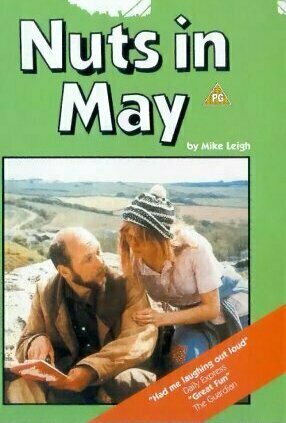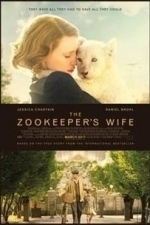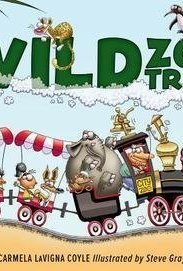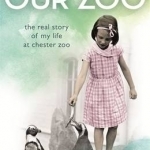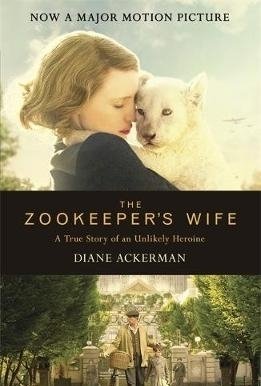Search
Search results
Erika (17789 KP) created a video about track Zoom In by Duran Duran in Red Carpet Massacre by Duran Duran in Music
Jun 18, 2019
Entertainment Editor (1988 KP) created a video about The Zookeeper's Wife (2017) in Movies
Apr 16, 2018
Benny Sadfie recommended Nuts in May (1976) in Movies (curated)
louise (3 KP) rated The Zookeeper's Wife (2017) in Movies
Jan 16, 2018
the zoo keeperd wife
Jessica Chastain plays the heroic figure of wartime Poland. in s holocaust drama total tear jerker that really makes you think definitely watch
Nicole Hadley (380 KP) rated Wild Zoo Train in Books
Jun 16, 2018
Wild Zoo Train by Carmela LaVigna Coyle & Illustrated by Steve Gray a charming is a fun book filed with trains and animals. It is full of great rhyming, repetition and vocabulary words. The strong illustration will have kids flipping the pages and wanting to read it again.
It is so very colorful, crazy train conductor, the kids see all kinds of animal that you would find in a zoo. It could also be easily use as a search and find. The book is all about children visiting the zoo and hoping on a train to see different parts of the zoo and the conductor making sure they have what ever they need to do that. Just a great all around book for memorize and practing words.
I received this ARC from Rowman & Littlefield and Muddy Boots via NetGalley in exchange for an honest review.
It is so very colorful, crazy train conductor, the kids see all kinds of animal that you would find in a zoo. It could also be easily use as a search and find. The book is all about children visiting the zoo and hoping on a train to see different parts of the zoo and the conductor making sure they have what ever they need to do that. Just a great all around book for memorize and practing words.
I received this ARC from Rowman & Littlefield and Muddy Boots via NetGalley in exchange for an honest review.
BBC Drama
This eBook was provided by the publisher via NetGalley in exchange for an honest review
Many people in Britain may have recently watched the drama series Our Zoo on BBC1 about the Mottershead family who moved to Oakfield, Upton in 1930 with the aim of building a zoo without bars. Based on a true story the drama over exaggerated the difficulties the family faced in developing what became to be the famous Chester Zoo. Until 2010 when TV producer Adam Kemp approached her, June Mottershead had never thought about making her history available to the public. As the truth had to be bent slightly for the television production with the removal of certain characters and added romance, and, of course, the laws preventing chimpanzees from being filmed, June Mottershead has penned the true story, also called Our Zoo, which is just as fascinating as what was shown on screen.
June was only four when she moved to Upton with her parents, grandparents, and her fourteen-year-old sister Muriel as well as a selection of animals. The BBC1 drama only showed up until the point that her father, George, had finally been given permission to build his zoo despite the petition against it. In the book, however, this occurs within the first few chapters and then continues on until June’s marriage to her husband Fred Williams in 1949. In fact the time period of the narrative jumps around depending on the animals or events that June is describing.
A large chunk of the book is focused on the effect the Second World War had on the zoo. As can be expected the rationings of vital products took its toll on the animals’ diets and, although the zoo never took a direct hit, the Liverpool blitz caused havoc by destroying the glass tanks in the aquarium. On the other hand, the amount of animals rapidly grew, as it was not just humans that became refugees during the war.
It was a delight to read about June’s relationships with some of the animals, particularly Mary the chimpanzee who was also June’s best friend as a child and behaved in a humanlike manner. Alas, as well as the happy moments there were the inevitable upsetting accounts of the deaths some of the animals, either from old age, illness or accidents.
While Our Zoo cannot be described as a novel, it neither has the feel of an autobiography. The conversational tone of the writing made it a pleasure to read and easy to visualize (admittedly watching the televised version had already provided a certain image).
This easy to read book is a strong recommendation for those who enjoyed the BBC adaptation and wish to find out what happened next. It does not matter if you have not watched the drama, as it is overall a fascinating story to read.
Many people in Britain may have recently watched the drama series Our Zoo on BBC1 about the Mottershead family who moved to Oakfield, Upton in 1930 with the aim of building a zoo without bars. Based on a true story the drama over exaggerated the difficulties the family faced in developing what became to be the famous Chester Zoo. Until 2010 when TV producer Adam Kemp approached her, June Mottershead had never thought about making her history available to the public. As the truth had to be bent slightly for the television production with the removal of certain characters and added romance, and, of course, the laws preventing chimpanzees from being filmed, June Mottershead has penned the true story, also called Our Zoo, which is just as fascinating as what was shown on screen.
June was only four when she moved to Upton with her parents, grandparents, and her fourteen-year-old sister Muriel as well as a selection of animals. The BBC1 drama only showed up until the point that her father, George, had finally been given permission to build his zoo despite the petition against it. In the book, however, this occurs within the first few chapters and then continues on until June’s marriage to her husband Fred Williams in 1949. In fact the time period of the narrative jumps around depending on the animals or events that June is describing.
A large chunk of the book is focused on the effect the Second World War had on the zoo. As can be expected the rationings of vital products took its toll on the animals’ diets and, although the zoo never took a direct hit, the Liverpool blitz caused havoc by destroying the glass tanks in the aquarium. On the other hand, the amount of animals rapidly grew, as it was not just humans that became refugees during the war.
It was a delight to read about June’s relationships with some of the animals, particularly Mary the chimpanzee who was also June’s best friend as a child and behaved in a humanlike manner. Alas, as well as the happy moments there were the inevitable upsetting accounts of the deaths some of the animals, either from old age, illness or accidents.
While Our Zoo cannot be described as a novel, it neither has the feel of an autobiography. The conversational tone of the writing made it a pleasure to read and easy to visualize (admittedly watching the televised version had already provided a certain image).
This easy to read book is a strong recommendation for those who enjoyed the BBC adaptation and wish to find out what happened next. It does not matter if you have not watched the drama, as it is overall a fascinating story to read.
<i>This eBook was provided by the publisher via NetGalley in exchange for an honest review</i>
Many people in Britain may have recently watched the drama series <i>Our Zoo</i> on BBC1 about the Mottershead family who moved to Oakfield, Upton in 1930 with the aim of building a zoo without bars. Based on a true story the drama over exaggerated the difficulties the family faced in developing what became to be the famous Chester Zoo. Until 2010 when TV producer Adam Kemp approached her, June Mottershead had never thought about making her history available to the public. As the truth had to be bent slightly for the television production with the removal of certain characters and added romance, and, of course, the laws preventing chimpanzees from being filmed, June Mottershead has penned the true story, also called <i>Our Zoo</i>, which is just as fascinating as what was shown on screen.
June was only four when she moved to Upton with her parents, grandparents, and her fourteen-year-old sister Muriel as well as a selection of animals. The BBC1 drama only showed up until the point that her father, George, had finally been given permission to build his zoo despite the petition against it. In the book, however, this occurs within the first few chapters and then continues on until June’s marriage to her husband Fred Williams in 1949. In fact the time period of the narrative jumps around depending on the animals or events that June is describing.
A large chunk of the book is focused on the effect the Second World War had on the zoo. As can be expected the rationings of vital products took its toll on the animals’ diets and, although the zoo never took a direct hit, the Liverpool blitz caused havoc by destroying the glass tanks in the aquarium. On the other hand, the amount of animals rapidly grew, as it was not just humans that became refugees during the war.
It was a delight to read about June’s relationships with some of the animals, particularly Mary the chimpanzee who was also June’s best friend as a child and behaved in a humanlike manner. Alas, as well as the happy moments there were the inevitable upsetting accounts of the deaths some of the animals, either from old age, illness or accidents.
While <i>Our Zoo</i> cannot be described as a novel, it neither has the feel of an autobiography. The conversational tone of the writing made it a pleasure to read and easy to visualize (admittedly watching the televised version had already provided a certain image).
This easy to read book is a strong recommendation for those who enjoyed the BBC adaptation and wish to find out what happened next. It does not matter if you have not watched the drama, as it is overall a fascinating story to read.
Many people in Britain may have recently watched the drama series <i>Our Zoo</i> on BBC1 about the Mottershead family who moved to Oakfield, Upton in 1930 with the aim of building a zoo without bars. Based on a true story the drama over exaggerated the difficulties the family faced in developing what became to be the famous Chester Zoo. Until 2010 when TV producer Adam Kemp approached her, June Mottershead had never thought about making her history available to the public. As the truth had to be bent slightly for the television production with the removal of certain characters and added romance, and, of course, the laws preventing chimpanzees from being filmed, June Mottershead has penned the true story, also called <i>Our Zoo</i>, which is just as fascinating as what was shown on screen.
June was only four when she moved to Upton with her parents, grandparents, and her fourteen-year-old sister Muriel as well as a selection of animals. The BBC1 drama only showed up until the point that her father, George, had finally been given permission to build his zoo despite the petition against it. In the book, however, this occurs within the first few chapters and then continues on until June’s marriage to her husband Fred Williams in 1949. In fact the time period of the narrative jumps around depending on the animals or events that June is describing.
A large chunk of the book is focused on the effect the Second World War had on the zoo. As can be expected the rationings of vital products took its toll on the animals’ diets and, although the zoo never took a direct hit, the Liverpool blitz caused havoc by destroying the glass tanks in the aquarium. On the other hand, the amount of animals rapidly grew, as it was not just humans that became refugees during the war.
It was a delight to read about June’s relationships with some of the animals, particularly Mary the chimpanzee who was also June’s best friend as a child and behaved in a humanlike manner. Alas, as well as the happy moments there were the inevitable upsetting accounts of the deaths some of the animals, either from old age, illness or accidents.
While <i>Our Zoo</i> cannot be described as a novel, it neither has the feel of an autobiography. The conversational tone of the writing made it a pleasure to read and easy to visualize (admittedly watching the televised version had already provided a certain image).
This easy to read book is a strong recommendation for those who enjoyed the BBC adaptation and wish to find out what happened next. It does not matter if you have not watched the drama, as it is overall a fascinating story to read.
